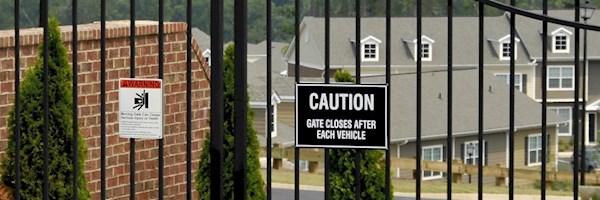A recent ruling by the Supreme Court of Appeal (SCA) in Bloemfontein found that gated estates are entitled to draw up traffic rules for their internal roads and to regulate access – and to impose fines for breaking these rules.
The issue arose when the daughter of Mount Edgecombe Country Club Estate resident Niemesh Singh received three fines for exceeding the 40km/h speed limit. Singh refused to pay the R3 000 in fines with the result that biometric access to the estate for Singh and his family was denied. He sought and obtained an urgent court order reinstating his access and then, along with fellow resident Munshurai Ramandh, launched further proceedings challenging the rights of the HOA to make other rules regulating access of domestic workers to the estate.
The SCA ruling by Judge Visvanathan Ponnan, with four judges concurring, overturned a previous judgment delivered by judges in the KwaZulu-Natal High Court in Pietermaritzburg.
The KZN High Court judges had declared invalid such rules at Mount Edgecombe, on the grounds that the estate’s homeowners’ association (HOA) was not entitled to assume the role of the transport MEC and local municipality. The High Court found that private estates were not entitled to impose speed limits or install traffic calming methods such as speed bumps.
The Mount Edgecombe Country Club Estate HOA took the matter to the SCA in 2017, and the u-turn judgment of the SCA now affirms the right of HOAs to make rules regulating particular kinds of conduct in private estates.
Read more: Can your HOA stop the sale of your unit?
Judge Ponnan said the KZN High Court judgment was wrong:
“They reasoned that the association was usurping the functions of traffic authorities by erecting traffic signs and speed humps. But the relationship between an owner and the association is a private, contractual one.
“It cannot be said that by ordaining a lower speed limit within a gated estate than that prescribed by national legislation goes beyond promoting, advancing and protecting the interests of residents, or is unreasonable, especially given the presence of children and wildlife.
“I fail to see why it is objectionable,” said Judge Ponnan.
“The SCA ruling is a good one,” says specialist community schemes attorney and BBM Law director Marina Constas. “Homeowners associations and bodies corporate needed clarity on this issue. It affirms my view that roads within private estates are not public roads.”
She says the crux of the matter is that Judge Ponnan emphasised that the rules of estates managed by homeowners associations and bodies corporate are contractual in nature. This means that conduct rules and restrictions imposed are entered into voluntarily by the estate residents – and, by association, their families, employees and visitors.
However, the SCA ruling doesn’t mean that HOAs and bodies corporate can now arbitrarily make any rules they want. In terms of the Community Schemes Ombud Service (CSOS) regulations, a special resolution is required to change any rules, with at least 75% of homeowners concurring.
The ombud service was established in 2016 in terms of the CSOS Act (9 of 2011), with the objective of regulating the conduct of parties within community schemes and ensuring their good governance. Changes to any rules in community schemes must first be submitted for approval to the chief ombud, who will then issue a compliance certificate. HOAs and bodies corporate need to familiarise themselves with the requirements for making rules. One requirement for setting up rules for community schemes is that penalties and fines can only be in the rules if there is a right to be heard. HOAs and bodies corporate should also make sure that the conduct rules that are filed with the CSOS include a provision for fines to be raised – and that the fines are reasonable.
It’s also important to ensure that none of the conduct rules or proposed fines is in conflict with any national or provincial legislation or local authority bylaws – and the overarching South African Constitution. For instance, an issue that has caused problems in the past is that of ritual slaughter on common property in community schemes.
Several bodies of corporate and HOAs used to prohibit ritual slaughter on common property in gated estates, but the CSOS ombud has ruled that this prohibition is not constitutional.
“There are many South Africans who undertake this kind of ritual as part of their cultural celebrations. The ombud’s decision is that provided the slaughter complies with the Meat Safety Act, it should be allowed,” says Constas.
See more: Community living - how to make it a success
Some tips for HOAs and bodies corporate on imposing fines:
- Impose fines in strict accordance with what is set out in the conduct rules. For example, trustees cannot impose an R1 000 fine when the rules state the fine for a particular infringement is R100.
- Send the homeowners an official warning letter telling them that they - or their tenants - are in breach of the rules and that a fine could be implemented.
- Ensure the offending owners have the opportunity to state their case to the body corporate trustees or the HOA directors before the fine is added to their next levy account. Make sure this meeting is minuted, and if the owners refuse the offer, that should also be minuted.
